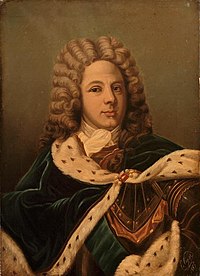Louis de Rouvroy, duc de Saint-Simon
| Louis de Rouvroy | |
|---|---|
| Duke of Saint-Simon | |
 |
|
| Spouse(s) | Marie-Gabrielle de Durfort |
|
Issue
Charlotte, Princess of Chimay
Jacques-Louis, Duke of Saint-Simon Armand-Jean, Marquis of Ruffec |
|
| Father | Claude de Rouvroy |
| Mother | Charlotte de L'Aubespine |
| Born | 16 January 1675 Paris, France |
| Died | 2 March 1755 (aged 80) Paris, France |
Louis de Rouvroy, duc de Saint-Simon (16 January 1675 – 2 March 1755), was a French soldier, diplomat and noted diarist. He was born in Paris at the Hôtel Selvois, 6 rue Taranne (today at 175 Blvd Saint-Germain).
The family's ducal peerage (duché-pairie), granted in 1635 to his father Claude de Rouvroy (1608–1693), served as both perspective and theme in Saint-Simon's life and writings.
Men of the noblest blood (in Saint-Simon's view) might not be and, in most cases were not, peers in France. Derived at least traditionally and imaginatively from the douze pairs (twelve peers) of Charlemagne, the peerage of France was supposed to be, literally, the chosen of the noblesse, deemed thereafter to incarnate the French nobility par excellence. Their legal pre-eminence derived from hereditary membership in the Parlement of Paris, the highest of France's judicial and quasi-legislative assemblies. Strictly speaking, a French peerage (usually attached to a dukedom) was granted in favour of a designated fief rather than upon the titleholder per se. Had Saint-Simon succeeded in his lifelong ideal and ambition of conversion of France's peers into a Great Council of the Nation, history might have followed a different course.
The family's principal seat, where Saint-Simon's Mémoires were written, was at La Ferté-Vidame, bought by his father shortly after his elevation to the dukedom. The castle brought with it the ancient, entailed title, Vidame de Chartres, borne as a courtesy style by the Duke's only son until he was eighteen: As it had been attributed to an elderly character in the well-known court novel La Princesse de Clèves, published in 1678, just three years after Saint-Simon's birth, his arrival at court as a young man may have been less inconspicuous than otherwise.
...
Wikipedia
